Catorceavo día del 2do reto / Fourteenth day of the 2nd challenge
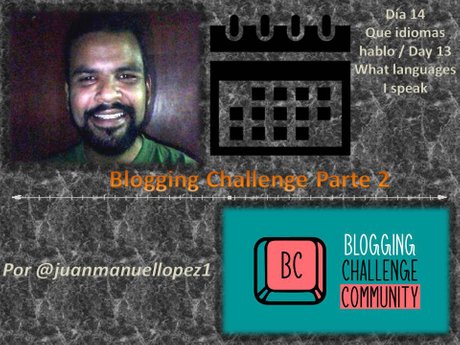

Espanish
Ya estoy casi a la mitad de este reto con el que ha sido difícil para mi ser constante, pero ha valido la pena todos estos esfuerzos para compartir mis participaciones con esta gran comunidad que ha hecho un gran aporte a la blockchain de Hive con estas propuestas tan novedosas e interesantes para todos los que hacemos vida en estos espacios que todavía tienen mucho que dar.
Nuevamente mis agradecimientos los dedico a toda la comunidad Smile por todas estas iniciativas y sobre todo por el apoyo que nos brindan a todos en sus espacios.
English
I am almost halfway through this challenge with which it has been difficult for me to be constant, but it has been worth all these efforts to share my participations with this great community that has made a great contribution to the Hive blockchain with these innovative and interesting proposals for all of us who make life in these spaces that still have much to give.
Once again I dedicate my thanks to the entire Smile community for all these initiatives and especially for the support they give to all of us in their spaces.

Foto de Pixabay en Pexels - Photo of Pixabay in Pexels
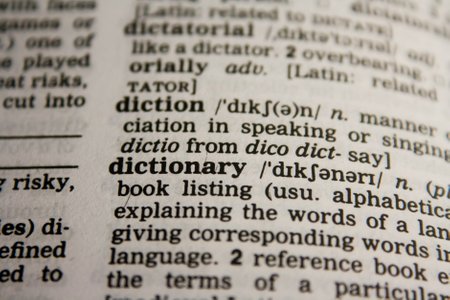
Espanish
Esta será una publicación un tanto limitante porque hablar diferentes idiomas de otros países es algo que aún no puedo hacer. El inglés lo entiendo a medias, pero sé que con un poco de esfuerzo puedo aprender a hacerlo.
Sin embargo por experiencia propia he sabido que el lenguaje es mucho más que un medio para comunicarnos. La realidad es que nosotros como seres humanos hacemos mucho más que usar el lenguaje para pedir ayuda, para manifestar un estado o sentimiento. Con la palabra podemos crear cosas con un alto grado de contundencia, dependiendo del compromiso que haya detrás de esas palabras, con el poder de cambiar toda una realidad para un día o para una semana, incluso para meses o toda una vida. Eso ya debería hablarnos de la responsabilidad que tenemos que tomar como exponentes de nuestras ideas y valores, y aprender a usar las palabras y todo el lenguaje para construir y aportar.
Partiendo de esto quiero hablarles de un lenguaje que si hablo y conozco bien además del español, pero que no es el idioma que mucha gente usaría para hacer la interacción que se vive en el día a día, aunque en la cotidianidad se ven también muchas manifestaciones en este idioma a través de anuncios de televisión, radio, y los hits musicales del momento. Pero definitivamente la interacción que se logra y se usa en el lenguaje que les comentaré a continuación no es lo común o lo más buscado por las personas. Mas sin embargo es el que mejor me identifica, y con el que puedo comunicar muchas más cosas que con el mismo idioma español que es el que yo hablo.
English
This will be a somewhat limiting publication because speaking different languages from other countries is something I still can't do. English is something I only half understand, but I know that with a little effort I can learn to do it.
However, from my own experience I have learned that language is much more than a means of communication. The reality is that we as human beings do much more than use language to ask for help, to express a state or feeling. With words we can create things with a high degree of forcefulness, depending on the commitment behind those words, with the power to change a whole reality for a day or a week, even for months or a lifetime. This should speak to us about the responsibility we have to take as exponents of our ideas and values, and learn to use words and all language to build and contribute.
Based on this I want to talk to you about a language that I speak and know well besides Spanish, but it is not the language that many people would use to make the interaction that is lived on a daily basis, although in everyday life we also see many manifestations in this language through television commercials, radio, and the musical hits of the moment. But definitely the interaction that is achieved and used in the language that I will discuss below is not the most common or the most sought after by people. However, it is the one that best identifies me, and with which I can communicate many more things than with the same Spanish language that I speak.

Entonces ¿Cual es el segundo idioma que hablo?
Para nadie es un secreto que en todas las artes se comunican mensajes bastante profundos a través de diversas propuestas basadas en diferentes combinaciones de sus componentes más característicos, llegando a transmitir desde mensajes literales y directos, hasta emociones, sentimientos, energía, movimiento, y muchas cosas que se entienden mejor al desarrollar nuestra espiritualidad.
Una de estas formas de arte es la música, la cual tiene que ver más que todo con las infinitas combinaciones que podemos hallar entre sonidos, y con las que nos podemos servir para transmitir un mensaje concreto.
Estas combinaciones están basadas en patrones melódicos, armónicos y rítmicos que podemos hallar de forma natural por ejemplo al buscar sonidos en un instrumento musical, por lo que todos estos temas que dan para escribir y publicar toda una serie en esta plataforma hacen posible contemplar la música como todo un lenguaje bien conformado y delineado.
Dentro de lo que seria el movimiento que ha impulsado este arte por miles y miles de años han habido una gran cantidad de propuestas musicales que han derivado en géneros, estilos, formas musicales, manifestaciones tradicionales religiosas y paganas, y manifestaciones modernas o de esta era actual, y muchas estructuras más que han permitido crear toda una cultura musical bien complementaria en todos los contextos sociales que hemos vivido como humanidad.
So what is the second language I speak?
It is no secret that all the arts communicate quite deep messages through various proposals based on different combinations of their most characteristic components, reaching to convey from literal and direct messages, to emotions, feelings, energy, movement, and many things that are better understood by developing our spirituality.
One of these art forms is music, which has to do more than anything else with the infinite combinations that we can find between sounds, and with which we can use to convey a specific message.
These combinations are based on melodic, harmonic and rhythmic patterns that we can find naturally, for example when looking for sounds in a musical instrument, so all these topics that give to write and publish a whole series on this platform make it possible to contemplate music as a whole language well shaped and delineated.
Within what would be the movement that has driven this art for thousands and thousands of years there have been a lot of musical proposals that have resulted in genres, styles, musical forms, traditional religious and pagan manifestations, and modern manifestations or of this current era, and many more structures that have allowed the creation of a whole musical culture well complementary in all social contexts that we have lived as humanity.

Foto de RODNAE Productions en Pixabay - Photo of RODNAE Productions in Pixabay
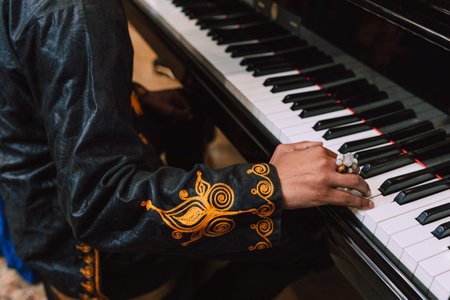
Yo no quisiera usar esta publicación para darles una cátedra sobre los conceptos que definen la música tanto en la teoría como en su parte espiritual porque para eso hay muchos libros de teoría musical y otras disertaciones adicionales muy buenas e interesantes a los que todos podemos acceder. Incluso yo cuando comencé en estos caminos del blogging lo hice publicando una serie de guías de teoría musical con la esperanza de poder ayudar a quienes estuvieran interesados en aprender más sobre la música, y esa es una serie que estoy planteándome reiniciarla pero con otras ideas y otras formas de organizar esos conceptos. Lo que quiero decir es que para definir lo que es realmente la música como arte y medio de expresión nos podemos conseguir con muchísima tela que cortar, y esta publicación no es la indicada, y menos suficiente para ese fin.
En cambio si quisiera compartirles un poco acerca de lo que significa para mi este lenguaje en mi vida. No siempre pude ver las cosas tal como las veo ahora, antes era un novato y no tenía ni idea de las cosas y sonidos que escuchaba. Tuve que pasar por un largo proceso para darme cuenta que la música es mucho más que aprenderse unos cuantos acordes y canciones para divertirse. Estas son cosas que se pueden entender con tan solo escuchar música, tal como lo haría la mayoría de las personas, pero pueden entenderse un poco más cuando nos disponemos a tomar un instrumento para sacarle música, y nos adentramos a los aspectos técnicos requeridos para ese instrumento, aplicando también cosas que son más universales (de las cuales hay una gran infinidad en muchísimas presentaciones). Y esto se puede entender aún mucho mejor cuando finalmente tocamos con otras personas, ya sea como solistas o como acompañantes, debido a la magnitud de la interacción que se puede lograr en un conjunto musical en un set, un concierto completo o una grabación. Digo esto especialmente porque quienes hemos experimentado todas estas facetas sabemos que no hay palabras que puedan describir con exactitud el mensaje que creamos los que estamos haciendo música en un momento determinado, y sobre todo cuando lo hacemos interactuando con un conjunto musical.
Describir esas cosas que no podemos ver pero podemos sentir al momento de tocar e interactuar es tarea imposible, y mucho más imposible cuando la alineación o combinación de todos estos elementos musicales están creando un mensaje que, el cien por ciento de las veces es un mensaje con el que solo puede haber comunicación de alma a alma. Son cosas que no están al alcance de la razón, aún cuando se hace alusión a cosas cotidianas de nuestras vidas con estos elementos.
I don't want to use this post to lecture you on the concepts that define music both theoretically and spiritually because for that there are many good and interesting music theory books and other additional dissertations that we can all access. Even when I started on the path of blogging I did so by publishing a series of music theory guides in the hope that I could help those who were interested in learning more about music, and that is a series that I am considering restarting but with other ideas and other ways of organizing those concepts. My point is that in order to define what music really is as an art and medium of expression we can find ourselves with a lot of material to cut through, and this publication is not the right one, let alone sufficient for that purpose.
Instead, I would like to share with you a little of what this language means to me in my life. I wasn't always able to see things the way I see them now, I used to be a novice and had no idea about the things and sounds I heard. I had to go through a long process to realize that music is much more than learning a few chords and songs for fun. These are things that can be understood simply by listening to music, as most people would do, but they can be understood a bit more when we pick up an instrument to make music with it, and get into the technical aspects required by that instrument, applying also more universal things (of which there are countless in many, many performances). And this can be understood even better when we finally play with other people, either as soloists or as accompanists, because of the magnitude of interaction that can be achieved in a musical ensemble in a set, a full concert or a recording. I say this especially because those of us who have experienced all of these facets know that there are no words that can accurately describe the message that those of us who are making music at any given moment create, and especially when we do so interacting with a musical ensemble.
Describing those things that we cannot see but we can feel at the moment of playing and interacting is an impossible task, and much more impossible when the alignment or combination of all these musical elements are creating a message that, one hundred percent of the time, is a message with which there can only be soul to soul communication. These are things that are beyond the reach of reason, even when alluding to everyday things in our lives with these elements.

Foto de cottonbro en Pexels - Photo of cottonbro in Pexels
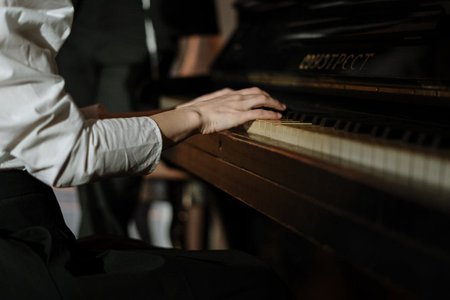
También hay que añadir que los mensajes que se transmiten con la música pueden abarcar un extenso abanico de temas o motivos a tratar, y por ende de posibilidades, abarcando esto mucho más allá de lo que hay en la letra de las canciones, ya que eso apenas es la punta del iceberg. Son las diferentes presentaciones en que pueden manifestarse las emociones y energías que transmiten los sonidos, ya que por ejemplo no es la misma alegría que produce un blues mayor tocado de la forma tradicional en que se toca, que otro blues mayor pero con un tempo más rápido, es una alegría frenética que dice algo más, que cambia el contexto. Por otro lado el blues no es un género para hablar de cosas alegres, entonces si aparte de todo lo que hemos propuesto también añadimos una letra con un mensaje alegre y optimista obtendremos una propuesta totalmente diferente, con un mensaje que quizás esconda algo, o simplemente es un acto de rebeldía. Todo depende de los elementos y la interpretación de cada uno de los ejecutantes, más lo que disponga el compositor o arreglista para esa pieza. Hay mucha música sin letra capaz de transmitir muchas cosas con mensajes muy profundos y que solo un oyente atento y con una buena puesta al día puede lograr empatizar con tales sonidos.
Y quizás esto sea lo único malo en esta historia..... que la música aún en este siglo 21 es un arte de unos pocos que nos atrevemos a lanzarnos a la aventura. La gente tiende a predisponerse porque lamentablemente no hay una cultura de saber apreciar las formas de arte, especialmente la música muy a pesar de que muchos no han caído en cuenta que sobre todo en estos tiempos la música la pueden encontrar a la vuelta de la esquina, lo cual es una gran muestra de que es totalmente imposible e inconcebible vivir en un mundo sin música. Si una persona dice que es capaz de internarse en una isla sin escuchar nada de música por un año o un mes, es un gran mentiroso. Tarde o temprano llegará el momento en que esa persona aunque sea tenga la curiosidad de golpear las ramas de los árboles, o frotas las hojas para escuchar su sonido. Siempre ha sido así para la humanidad, desde sus comienzos en la prehistoria hasta estos últimos tiempos.
Hay tantas cosas que podría decir para demostrarles porque es importante aprender a apreciar la música, pero hay muchísimas cosas que me quiero reservar para futuras publicaciones que siempre he querido hacer pero no he tenido hasta ahora la ocasión para hacerlas. Solo puedo decir que tengo el privilegio de expresarme con el idioma de la música desde hace más de 20 años, y aunque muchas veces me he sentido solo en este camino he tenido la oportunidad de conocer a muchas personas con las que puedo compartir estos ideales artísticos, espirituales, y al final de cuentas....mi propia filosofía de vida.
It is also necessary to add that the messages that are transmitted with the music can cover an extensive range of topics or motives to treat, and therefore of possibilities, covering this much more beyond what there is in the lyrics of the songs, since that is only the tip of the iceberg. They are the different presentations in which the emotions and energies that transmit the sounds can be manifested, since for example it is not the same joy that produces a major blues played in the traditional way in which it is played, that another major blues but with a faster tempo, it is a frenetic joy that says something more, that changes the context. On the other hand the blues is not a genre to talk about happy things, so if apart from all that we have proposed we also add a lyric with a happy and optimistic message we will obtain a totally different proposal, with a message that perhaps hides something, or it is simply an act of rebellion. It all depends on the elements and the interpretation of each of the performers, plus what the composer or arranger has for that piece. There is a lot of music without lyrics capable of transmitting many things with very deep messages and that only an attentive listener with a good update can manage to empathize with such sounds.
And perhaps this is the only bad thing in this story..... that music even in this 21st century is an art of a few of us who dare to take the plunge. People tend to be predisposed because unfortunately there is no culture of knowing how to appreciate art forms, especially music, even though many have not realized that especially in these times music can be found just around the corner, which is a great sign that it is totally impossible and inconceivable to live in a world without music. If a person says that he is able to go to an island without listening to any music for a year or a month, he is a big liar. Sooner or later the time will come when that person will even have the curiosity to knock on the branches of trees, or rub the leaves to listen to their sound. It has always been that way for mankind, from its beginnings in prehistoric times to these recent times.
There are so many things I could say to show you why it is important to learn to appreciate music, but there are so many things I want to reserve for future publications that I have always wanted to do but have not had the opportunity to do so far. I can only say that I have had the privilege of expressing myself with the language of music for more than 20 years, and although many times I have felt alone in this path I have had the opportunity to meet many people with whom I can share these artistic, spiritual ideals, and at the end of accounts .... my own philosophy of life.
Enlaces de mis entradas anteriores en el Blogging Challenge 2
- Palabra exitosa / Successful word - Día 1 Reto 2 del Blogging Challenge.
- La mejor inversión que he hecho / The best investment I have ever made - Día 2 Reto 2 del Blogging Challenge.
- El peor consejo que he escuchado en mi trabajo / The worst advice I have ever heard in my job - Día 3 Reto 2 del Blogging Challenge.
- Tres personas que he seguido de cerca / Three people I have followed closely - Día 4 Reto 2 del Blogging Challenge.
- El mejor consejo recibido / The best advice received - Día 5 Reto 2 del Blogging Challenge.
- 3 artículos para vivir en una isla desierta / 3 items for living on a desert island - Día 6 Reto 2 del Blogging Challenge.
- ¿Como es mi dieta habitual? / How is my regular diet?.
- Creencias que otros piensan que es una locura / Beliefs that others think are crazy - Día 8 Reto 2 del Blogging Challenge.
- ¿Qué pondría en un cartel publicitario? / What would I put on a billboard? - Día 9 Reto 2 del Blogging Challenge.
- Tiempo de predicción ¿Que pasará en 5 años? / Prediction time. What will happen in 5 years? - Día 10 Reto 2 del Blogging Challenge.
- ¿Que es el amor? / What is love? - Día 12 Reto 2 del Blogging Challenge.
- ¿Que es el odio? / What is hate? - Día 13 Reto 2 del Blogging Challenge.
Foto de @blogging-team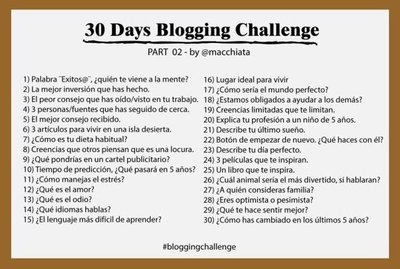

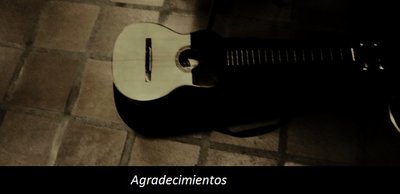
Muchas gracias a toda la comunidad Smile por traer estas novedosas iniciativas a esta plataforma creando estos maravillosos resultados. Y muchas gracias a todos ustedes por su valioso apoyo.
¡Saludos!
Thank you very much to the entire Smile community for bringing these innovative initiatives to this platform creating these wonderful results. And many thanks to all of you for your valuable support.
Regards!

Créditos: - Foto de la portada, separadores, banner y firma hechos por @juanmanuellopez1 con los editores Power Point y Paint.
- Logo en la portada del proyecto @blogging-team para la comunidad Smile.
- Cover photo, separators, banner and signature made by @juanmanuellopez1 with Power Point and Paint editors.
- Logo on the cover of the project @blogging-team for the Smile community.

- La mejor inversión que he hecho / The best investment I have ever made - Día 2 Reto 2 del Blogging Challenge.
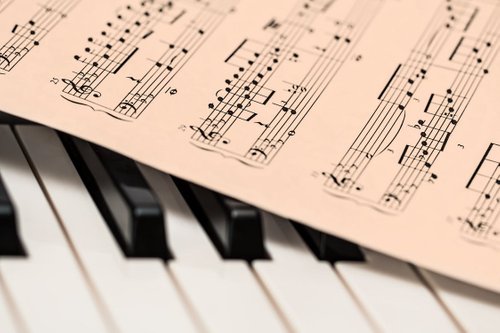

Felicitaciones ya vas por el día 13 del reto. Me encantó tu publicación, muy inspiradora. Definitivamente la música es una expresión de arte y su lenguaje transmite demasiado hasta llegar al alma. Pienso que el pentagrama es parte de su lenguaje, saber leerlo es todo un mundo. Mi hijo de 7 años tiene una materia de música en la escuela y estamos tratando de aprender a leer el pentagrama, definitivamente hay que tener sentido del ritmo. Un abrazo!
Muchas gracias por tus bonitas y estimulantes palabras @xandra79! Que bueno saber que te gustó esta publicación y lo de tu hijo, es genial. Esa es la idea, dar a conocer la música como un lenguaje más que se puede aprender y encontrar cosas útiles para nosotros.
Saludos!!!
Gracias a ti y te felicito por esmerarte en darnos parte de tu mundo musical. Un abrazo!